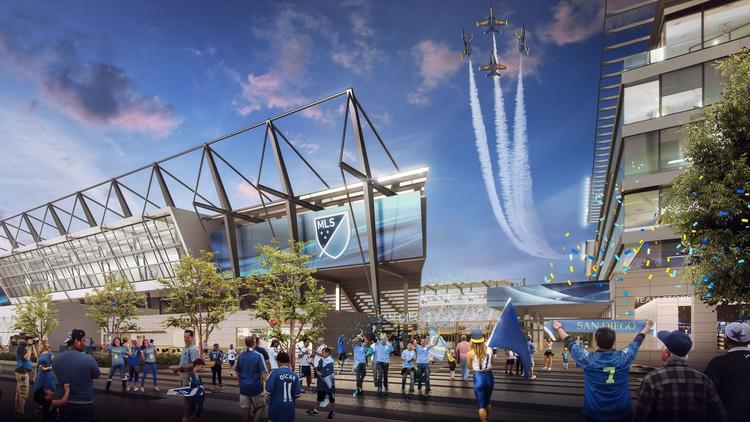The San Diego City Council voted last night to schedule a SoccerCity referendum in the 2018 November general election, rather than calling for a 2017 special election — potentially putting the city at a disadvantage in landing an MLS expansion team this year or less.
The 5-4 vote was along partisan lines, with five Democrats rejecting the notion of a special election this fall in favor of a 2018 referendum. Mayor Kevin Faulconer and FS Investors, creators of the SoccerCity plan, had pushed for a November 2017 referendum to fit with an MLS expansion timeline that will see the league expand by four teams in coming years.
MLS has laid out a path for expansion from 24 to 28 teams, with 12 cities applying for a team. The SoccerCity initiative in San Diego would see an MLS stadium anchor a redevelopment of the 166-acre Qualcomm Stadium site. Under the terms of the plan, an independent appraisal will determine the fair-market value of the 166-acre site, with FS Investors committing to paying 10 percent of the agreed-upon price annually. FS Investors would also commit to building a 33,500-seat stadium expandable to 40,000, with the cost split between FS Investors and SDSU. The proposed SoccerCity development features more than 2.4-million square feet of office space, 4,800 homes, two hotels and 800 student apartments on the 166-acre Qualcomm Stadium site.
Since the introduction of the SoccerCity plan, there’s been a fierce debate over the future of the Qualcomm Stadium site, with other developers lobbying against the planning favor of opening bidding for the 166-acre site. The SoccerCity plan is based on existing arrangements the city has to lease public land to private developers, but some feel a better deal can be made. With SDSU also opposing the plan, there’s enough political will to delay the decision. From the San Diego Union-Tribune:
Some council members also expressed support for considering competing proposals for the site, particularly those that would alleviate concerns that San Diego State has raised about SoccerCity.
They also mentioned concerns about the project raised recently by City Attorney Mara Elliott.
“Although I have been an advocate for economic development, local quality jobs and the idea of having a major sports team in our city, I want to take the necessary measures to address the concerns brought to us by our city attorney and explore all of the viable options in the redevelopment of Qualcomm Stadium,” Council President Myrtle Cole said.
The concern from FS Investors: How this will affect MLS expansion. It’s no secret MLS officials see San Diego as a prime expansion market, but in recent weeks MLS officials have said they will not let partisan politics affect the expansion schedule. But there are no hard and fast deadlines regarding MLS expansion, and you could see a scenario where two expansion franchises are announced by the end of 2017 and two more in 2018. With several other cities (including Cincinnati) still working on stadium initiatives, you could see MLS expansion come later — not sooner.
RELATED STORIES: SoccerCity Backers Will Still Lobby for Special Election; Appraisals: Proposed Site of SoccerCity Worth $110.1M; San Diego City Council Rejects Fall SoccerCity Special Election; MLS: We Won’t Wait for San Diego MLS Referendum; San Diego Mayor Endorses Revised SoccerCity MLS Pitch; SDSU Ends Talks to Share New San Diego MLS Stadium; Report: SoccerCity Would Produce Millions in Annual Tax Revenue; FS Investors Submits SoccerCity Petitions; SoccerCity Proposal Could be Placed on November Ballot; SoccerCity Could Have an Annual $2.8 Billion Economic Impact; SoccerCity MLS Proposal Unveiled by San Diego Investors; San Diego, Tampa Bay Make Their MLS Cases; San Diego MLS Plan Unveiled; San Diego Close to Revealing MLS Pitch; San Diego Looks to Advance MLS Stadium Push; Residents Polled on New San Diego MLS Stadium; Padres Owner Among Potential San Diego MLS Leaders; San Diego Eying MLS Team

